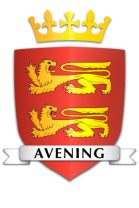

© Avening Parish Council 2023
“Preserve, Conserve, Enhance”
14 Frank Locke
Private: 5th Battalion Gloucestershire Regiment Frank missed the 1891 census by just a few weeks but his three elder brothers and one sister were included, living with father, John Locke (born Avening 1862) and mother Jane (née Milsom) born the same year at Tresham, near Hawkesbury. Frank was born at Crackstone as was his younger sister, Annie. His paternal family history is solidly of Avening and from our records now held in the church, we can trace his ancestry with Samuel Brown (born 1765), Sarah Ind (baptised 1772) and William Dee (baptised 1767) among his 32 three- times great grandparents. Frank entered the First World War in 1915 as another of Avening's Kitchener’s New Army but did not arrive in France until the following year. We catch up with him in early July 1916 at the outbreak of the Battle of the Somme. The early part of that battle proved disastrous in our losses, mainly due to observation by enemy troops from the higher ground in the region, which, although not particularly high, gave them the means to direct their artillery and also warn their entrenched forces of our advances. Part of this high ground included the village of Pozières and it was decided that Pozières and its surrounding high ground would be taken. The main attack was scheduled for the night of 22/23 of July and two Australian divisions were tasked to attack from the south of the village, whilst being supported by the 145th Brigade, part of the 48th (South Midlands) Division, that brigade including the 5th Battalion Glosters. The weather was fine on that Saturday/Sunday night and the attack on the German trenches was preceded by the usual artillery bombardment. At 35 minutes past midnight the Glosters advanced with the 4th Battalion Oxford and Bucks Light Infantry on their right. Despite it being dark, the attack was quickly discovered by the enemy who were holding their trenches in some strength. Heavy artillery and machine-gun fire fell upon our troops and, despite reinforcements being brought up, the objectives could not be reached. The battle went on for over three hours at which time the Glosters were withdrawn to the reserve trenches, being replaced by men of the Berkshire Regiment. Later that morning the Germans had retreated. In the attack the Glosters had lost 150 men killed, missing or wounded, Frank Locke being one of the twelve killed. Meanwhile, the Australians had eventually taken the main village of Pozières but only suffering terrible losses. Even today, their contribution remains legendary in Pozières history. Frank is buried at the Pozières British Cemetery, the next grave to him being that of a 21 year old man from Oxford. He was awarded the Victory Medal and the British Medal, both of which would have been presented to his parents at the end of hostilities. He was 25 years old and unmarried. We have been unable to locate any near relatives.
AveningArchive
WW1 Heroes





© Avening Parish Council 2023
AveningArchive
14 Frank Locke
Private: 5th Battalion Gloucestershire Regiment Frank missed the 1891 census by just a few weeks but his three elder brothers and one sister were included, living with father, John Locke (born Avening 1862) and mother Jane (née Milsom) born the same year at Tresham, near Hawkesbury. Frank was born at Crackstone as was his younger sister, Annie. His paternal family history is solidly of Avening and from our records now held in the church, we can trace his ancestry with Samuel Brown (born 1765), Sarah Ind (baptised 1772) and William Dee (baptised 1767) among his 32 three-times great grandparents. Frank entered the First World War in 1915 as another of Avening's Kitchener’s New Army but did not arrive in France until the following year. We catch up with him in early July 1916 at the outbreak of the Battle of the Somme. The early part of that battle proved disastrous in our losses, mainly due to observation by enemy troops from the higher ground in the region, which, although not particularly high, gave them the means to direct their artillery and also warn their entrenched forces of our advances. Part of this high ground included the village of Pozières and it was decided that Pozières and its surrounding high ground would be taken. The main attack was scheduled for the night of 22/23 of July and two Australian divisions were tasked to attack from the south of the village, whilst being supported by the 145th Brigade, part of the 48th (South Midlands) Division, that brigade including the 5th Battalion Glosters. The weather was fine on that Saturday/Sunday night and the attack on the German trenches was preceded by the usual artillery bombardment. At 35 minutes past midnight the Glosters advanced with the 4th Battalion Oxford and Bucks Light Infantry on their right. Despite it being dark, the attack was quickly discovered by the enemy who were holding their trenches in some strength. Heavy artillery and machine-gun fire fell upon our troops and, despite reinforcements being brought up, the objectives could not be reached. The battle went on for over three hours at which time the Glosters were withdrawn to the reserve trenches, being replaced by men of the Berkshire Regiment. Later that morning the Germans had retreated. In the attack the Glosters had lost 150 men killed, missing or wounded, Frank Locke being one of the twelve killed. Meanwhile, the Australians had eventually taken the main village of Pozières but only suffering terrible losses. Even today, their contribution remains legendary in Pozières history. Frank is buried at the Pozières British Cemetery, the next grave to him being that of a 21 year old man from Oxford. He was awarded the Victory Medal and the British Medal, both of which would have been presented to his parents at the end of hostilities. He was 25 years old and unmarried. We have been unable to locate any near relatives.WW1 Heroes



























